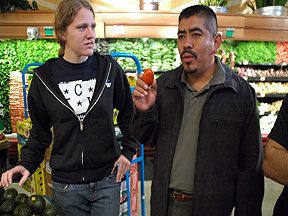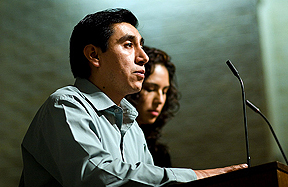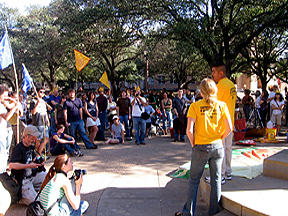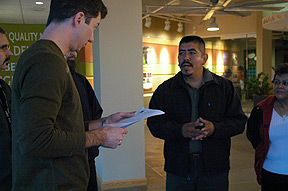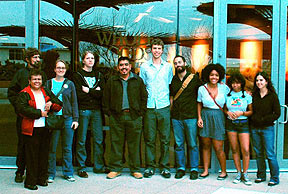FEB. 7-11, 2008
CIW VISITS AUSTIN, TX
|
That is indeed a Whole Foods store, in this case the organic giant’s flagship store in Austin, Texas, and that is a tomato, but nobody’s buying anything here. Rather, Lucas was in Whole Foods as part of a delegation of Fair Food activists visiting the company’s corporate headquarters to “re-deliver” a letter to Whole Foods CEO John Mackey (after the company’s spokesperson claimed that they had never seen the certified letter from March 14th, 2007). And while the visit to the headquarters left much to be desired (see below for a report on the visit), the trip to the store itself certainly was an eye-opener, as the delegation came across a bold display of “Santa Sweets” tomatoes — a product of Ag-Mart, the Florida-based tomato giant with a most unsavory reputation for health, safety, and wage and hour violations. For a sense of that reputation, here are a few articles on Ag-Mart and Santa Sweets from the past few years for your consideration: * On pesticides That last one is particularly interesting. It is a report on the filing of a class action suit by nearly 200 farmworkers from Immokalee who are suing Ag-Mart for somewhere between $250,000 and $2 million in unpaid wages. According to the workers’ attorney, Ag-Mart “didn’t pay the minimum wage. They doctored the books to hide it.” So, why is a company like Whole Foods, a widely-recognized leader in the sustainable food market and a vocal proponent of social responsibility in food production, selling Ag-Mart tomatoes, you ask? Maybe the company had some answers for the Fair Food delegation… |
The CIW & Student/Farmworker Alliance (SFA) visit to Austin that culminated in the Whole Foods delegation was a four-day whirlwind of activity, packed full of education and action. The Austin Fair Food allies that organized the visit managed to squeeze several class presentations to high school and university students, church presentations, a community gathering for a photo exhibit on farmworker conditions, a radio interview, a Fair Food dinner, a highly successful Burger King protest, and a visit to Whole Foods all into one extended weekend. The visit began on Thursday, February 7th, as the CIW delivered the keynote address at the 28th annual Student Conference on Latin America to a standing room-only crowd of more than 150 gathered at the University of Texas from across US and Latin America. Above, the CIW was presented at the conference in a heartfelt introduction by members of Proyecto Defensa Laboral (PDL), an Austin-based organization of immigrant workers, many of whom work in the city’s booming construction industry. PDL was present at all the events of the jam-packed weekend and we are excited that they will be among the leadership of the Campaign for Fair Food in Austin in the months and years ahead. |
 The CIW’s keynote address, explaining the forces driving workers to the U.S., and the conditions they face once here, was well-received. The CIW’s keynote address, explaining the forces driving workers to the U.S., and the conditions they face once here, was well-received. |
 On Friday, the delegation hit the high schools, here shown during a presentation to a Student/Farmworker Alliance chapter at LBJ high school. |
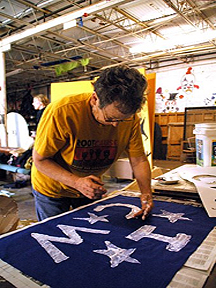 Saturday was a day of action. But before every good action there must be an art-making session, and this day was no exception. Actually, this was an art-making and campaign workshop for which Austin Fair Food activists were joined by those stalwarts to the north… the fine folks of Fair Food Lawrence (Kansas)! Here one of the Lawrence crew puts the finishing touches on a flag for the afternoon march. |
|
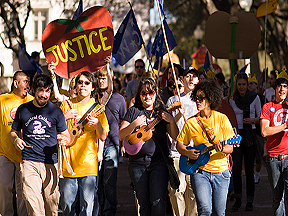 Marchers came from across the great state of Texas, with delegations from Austin, Houston, Dallas, San Antonio, and the Rio Grande Valley (and did we mention Lawrence, Kansas?…). The youthful crowd was accompanied by several families and a conjunto de jaranas, courtesy of Austin’s own Son Armado. |
|
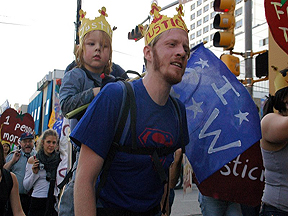 As is their custom, the Lawrence crew brought the always sweet family vibe to the march. Austin and Lawrence are SFA sister cities, by the way. |
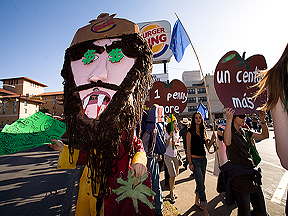 And speaking of Lawrence (my goodness, the good people of Austin are going to start getting jealous…), the much-traveled Burger King puppet from Lawrence made its appearance. This menacing marionette has been to every BK restaurant in Lawrence, it’s been to Immokalee and Miami, and now it’s been to Austin, too. |
 A Sunday highlight was the Fair Food dinner, giving the Austin event organizers a more casual context in which to build new alliances for the campaign in the Texas capital (and their first chance to relax after several days of non-stop organizing!). Here Lucas (right) and Rudy Cortinas of Austin Fair Food address the more than 50 attendees. |
 And finally, Monday arrived and the human rights delegation headed for its visit to Whole Foods. Lucas — shown here in Whole Foods’ waiting room, surrounded by the words of the sustainable food leader’s “core values” — didn’t know quite what to expect from a meeting with Whole Foods’ corporate leaders, but given the CIW’s undisputed track record in the fight against farmworker exploitation, and the documented human rights crisis in Florida’s tomato fields, he at least had reason to hope that Whole Foods would welcome the opportunity to partner with a community-based worker organization like the CIW… |
|
In the universal language of a homeowner receiving an unwanted visitor, a Whole Foods representative met the delegation in the lobby and received the letter on Whole Foods’ proverbial doorstep. The representative conveyed the message, loud and clear, that a more gracious welcome was not in the cards. Whole Foods would not this day be hearing from workers and consumers concerned about human rights conditions in the fields where Whole Foods tomatoes are picked. Well… at least with this photo they can no longer claim that they’ve never seen the letter… |
All in all, the visit was an educational experience for the Austin Fair Food crew and their CIW and SFA allies, and the lesson they took away from it was this: Whole Foods is acting just like any other giant food corporation — refusing to take any action until pressured, then claiming they’re being treated unfairly when pressured (even ever so slightly…). And that just doesn’t make sense. Whole Foods proudly markets its fair trade purchasing program for products sourced overseas, which you can read about in this press release from March of last year: “Whole Trade Guarantee to Source Socially Responsible Products from Developing Countries”. In it, Whole Foods promises, in its own words, to “help combat poverty” through “better wages and working conditions for workers.” Clearly, we couldn’t agree more with the goals of the “Whole Trade” program. We support those goals so much, in fact, that we believe that they should apply to Whole Foods’ purchasing policies here in the US, too, because agricultural workers in the US also face systemic poverty and exploitation. Certainly Whole Foods would not dispute that there is a human rights crisis in Florida’s fields — with now seven major slavery prosecutions in the past ten years, prompting one federal prosecutor to term Florida “ground zero for modern-day slavery,” and with everyday conditions in the fields so bad that they can only be described as sweatshop conditions (sub-poverty wages, no right to overtime pay, no right to organize, etc.). In the words of Senator Bernie Sanders following his recent visit to Immokalee, “the norm is a disaster, and the extreme is slavery.” Yet Whole Foods continues to buy Florida tomatoes and refuses to even meet with CIW representatives to discuss efforts to address farmworkers’ unconscionable wages and working conditions. At the very least, given the harsh reality in Florida’s fields, Whole Foods should share with its consumers just what sort of auditing protocols it currently has in place to determine that its tomatoes are in fact free of forced labor, or what purchasing policies it follows to guarantee that the workers who pick its tomatoes are paid a fair wage and enjoy humane working conditions. We hope Whole Foods takes the time to reassess its position on this and accepts our offer to talk about how we can work together to address the human rights crisis in Florida’s fields today. Its customers would expect — indeed demand — nothing less. |

